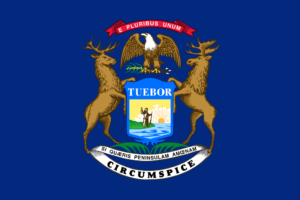 Front-runners Joe Biden and Donald Trump easily prevailed in their respective primaries last night in Michigan. While that much is clear, there remains considerable and contentious debate over just what these results mean for November. So let’s dive in!
Front-runners Joe Biden and Donald Trump easily prevailed in their respective primaries last night in Michigan. While that much is clear, there remains considerable and contentious debate over just what these results mean for November. So let’s dive in!
With nearly all of the precincts in, Biden stands at 617,925 votes (81.1%) while 101,049 voters (13.3%) chose Uncommitted. Marianne Williamson actually finished ahead of Rep. Dean Phillips for third place, 22,688 votes (3.0%) compared to 20,525 votes (2.7%). That performance apparently inspired Williamson to un-suspend her campaign.
In the GOP primary, with almost all of the vote in, Trump received 756,134 votes (68.1%). Nikki Haley sits at 294,680 votes (26.5%) while 33,380 voters (3.0%) went with Uncommitted.
DDHQ called both the Democratic and Republican contests when the last polls in Michigan closed at 9:00 pm EST.
The top topic of debate, of course, was that Uncommitted vote in the Democratic primary. With Michigan containing the highest percentage of Arab-Americans, critics of the President’s Israeli policy saw an opportunity to send the White House a message.
This campaign was promoted by the likes of Congresswoman Rashida Tlaib, Dearborn Mayor Abdullah Hammoud and former 2020 Presidential candidate Beto O’Rourke among others.
Coming into tonight, it was unclear just what success for the Uncommitted effort would look like. Last month, for instance, a write-in ‘Ceasefire’ campaign secured a disappointing 1,497 votes in the Democratic New Hampshire Primary.
One Pro-Uncommitted group, Listen to Michigan, set the bar low at a 10,000 vote goal. Right before the polls closed, Michigan Democrats countered by moving the goalposts to 100,000, which was about where the total protest vote ultimately ended up.
Pro-Biden forces were quick to compare last night’s results to similar numbers from the 2012 Michigan Democratic Caucus, when Uncommitted secured 10.69% against incumbent President Barack Obama (although with a far fewer 20,833 votes).
Although largely forgotten now, Obama lost about 10% of the vote in those primaries to a number of fringe candidates – as well as Uncommitted – in a series of deep red states like Arkansas, Kentucky, Oklahoma and West Virginia. While these efforts accumulated 106 delegates, by the Convention Obama’s support was still unanimous.
It’s still unclear whether Uncommitted will win any delegates out of Michigan this time, with early estimates giving Biden at least 109 of the state’s 117 delegates.
Over in the Republican contest, most of the conversation revolved around Trump’s margin of victory. As FiveThirtyEight’s Nathaniel Rakich pointed out, Trump’s margin has run behind his polling average in each of the first four contests.
Our own Decision Desk HQ/The Hill average of Michigan GOP Primary polls going into last night put Donald Trump at 70.2% and Nikki Haley at 21.5%.
Nonetheless, Trump notched yet another victory Tuesday while extending his lead ahead of delegate-rich Super Tuesday contests; including California, Massachusetts, Minnesota, North Carolina, Tennessee, Texas and Virginia among others.
Finally, let’s take an early look at total turnout in these contests and how it compares to Michigan primaries going back to 1992.
Michigan Primaries Turnout
1992 Dem: 585,972
1992 GOP: 449,133
1996 Dem: No Primary
1996 GOP: 524,161
2000 Dem: 19,160 (Caucus)
2000 GOP: 1,276,770
2004 Dem: 163,769 (Caucus)
2004 GOP: No Primary
2008 Dem: 601,219 (Delegates Stripped, Obama Not on Ballot)
2008 GOP: 869,293
2012 Dem: 194,887 (Caucus)
2012 GOP: 996,499
2016 Dem: 1,205,552
2016 GOP: 1,323,589
2020 Dem: 1,587,679
2020 GOP: 683,431
2024 Dem: 762,187
2024 GOP: 1,110,373
Republicans won the overall turnout race, an encouraging sign for them. The last two times each party held a competitive primary in Michigan on the same day, 1992 and 2016, the party that spurred higher turnout went on to win Michigan and the Presidency in November.
A silver lining for Biden and the Democrats is that their turnout yesterday still exceeded what incumbent Trump was able to produce in the 2020 Republican primary.
South Carolina GOP Primary Results
Last Saturday’s contest in the Palmetto State was similarly anticlimactic, as DDHQ again called that race the moment the polls closed at 7:00 pm EST.
With just about all of the precincts in, Donald Trump finished first with 451,905 votes (59.8%) while Haley settled at 298,674 votes (39.5%).
Once again, Trump ended up performing just a few points behind our final Decision Desk HQ/The Hill polling average; which put Trump at 63.8% while Haley had 33.1%
As you can see below, in terms of total voter turnout, this primary narrowly broke the record set by the 2016 Republican contest.
South Carolina Primary Turnout
1992 Dem: 116,414
1992 GOP: 148,840
1996 Dem: No Primary
1996 GOP: 273,583
2000 Dem: 9,657 (Caucus)
2000 GOP: 573,101
2004 Dem: 292,383
2004 GOP: No Primary
2008 Dem: 532,468
2008 GOP: 445,677
2012 Dem: No Primary
2012 GOP: 603,770
2016 Dem: 370,904
2016 GOP: 740,881
2020 Dem: 539,263
2020 GOP: No Primary
2024 Dem: 131,472
2024 GOP: 755,800
Of the state’s 50 delegates, Trump won 47 while Haley managed to take 3. Haley’s delegates came from running ahead of Trump in the state’s 1st Congressional district, which contains Charleston and runs along most of the state’s coastline.
While debates about the comparative strengths of candidates Biden and Trump will no doubt continue, both of them are poised to wrap up their party’s nominations in the weeks ahead. We’re also poised to learn much more about their respective standing when a slew of new data flows in from the Super Tuesday states one week from now.
So make sure to return to Decision Desk HQ on March 5th for live Super Tuesday results, and keep an eye out for my day-after recap breaking it all down!